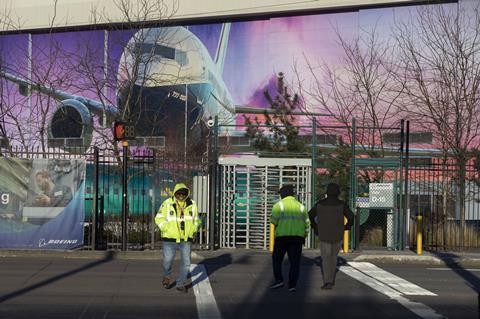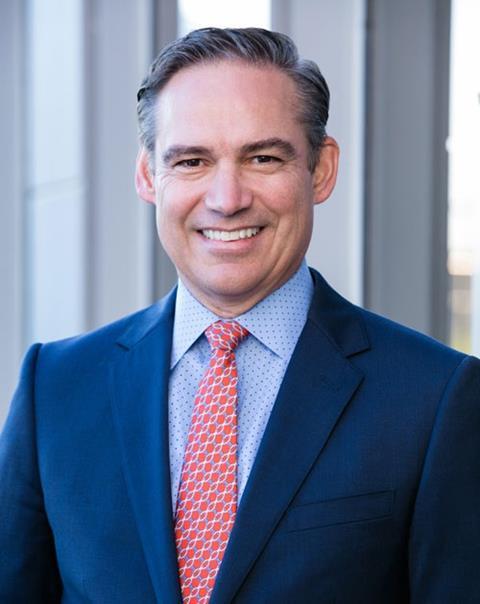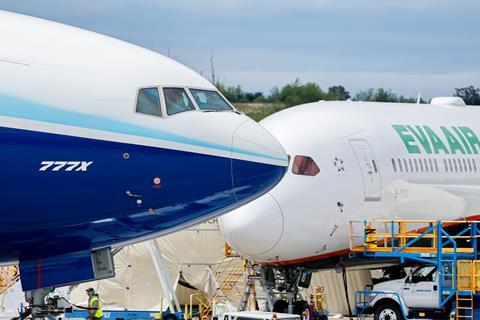There is a sense among people who study Boeing that the company’s board of directors made a very good decision in picking longtime aerospace executive Kelly Ortberg to succeed David Calhoun as chief executive.
“Best choice they could have made,” says Alex Krutz, managing director at aerospace and defence advisory Patriot Industrial Partners. “He exhibits everything that can make a company like Boeing great.”

Krutz is among analysts who view Ortberg, an engineer by education who had been Collins Aerospace CEO until 2020, as the right person for Boeing’s top job. They cite the veteran executive’s experience across various aerospace industry sectors, and his embrace of business fundamentals like company culture and customer service.
Boeing on 31 July said Ortberg will succeed Calhoun as CEO on 8 August. Calhoun, who took over as CEO from Dennis Muilenburg in 2020, will remain a special board advisor until March 2025. Boeing’s stock price jumped 4% on the news.
“You couldn’t ask for a better selection,” says analyst Richard Aboulafia with AeroDynamic Advisory.
Aboulafia views Boeing, in picking Ortberg, as stepping back toward its engineering roots – and away from the finance-centric management team that has been in charge for several decades.
“You couldn’t get any more opposite than the fast-motion train wreck that has been running the company,” Aboulafia says.
According to a source familiar with the matter, Ortberg will be based in Seattle – a surely welcome change for the Puget Sound region, which in recent years has watched as Boeing shifted production elsewhere and moved its headquarters first to Chicago and then, in 2022, to Virginia, solidifying a perception that Boeing lost its way.
“He is highly respected in the industry. He has important operational and engineering experience, and we think he has the potential to do some of the things Boeing needs most, including restoring relationships with customers, suppliers, regulators and legislators,” a 31 July research note from JP Morgan says of Ortberg.
The incoming Boeing chief graduated with a degree in mechanical engineering from The University of Iowa in 1982, taking a job the following year with Texas Instruments before joining Cedar Rapids-based Rockwell Collins in 1987 as programme manager. Ortberg worked his way up to become the aerospace supplier’s CEO in 2013.

“There were so many lessons learned from Cedar Rapids,” Kevin Michaels, also with consultancy AeroDynamic, says of Ortberg’s tenure at Rockwell.
There, Ortberg solidified his reputation as a respected, pragmatic, “down to earth” leader – an executive with an open mind who does not push grand theories about how he thinks the business world is supposed to work, says Michaels, who once worked alongside Ortberg at Rockwell.
“He’s a workhorse, not a show horse,” Michaels adds. “He’s going to hear all sides of the story and… give it deep thought and then make a decision.”
Michaels notes Ortberg cut his teeth under the tutelage of legendary Rockwell CEO Clayton Jones. Back then, Rockwell was known for a management philosophy Michaels calls “balanced capitalism”, which stresses “taking care of employees, customers, suppliers, the local community as well as shareholders”.
Ortberg led Rockwell through the acquisition of in-flight connectivity provider Arinc in December 2013, a move that made Rockwell into a service provider, not just a component provider, Michaels notes.
In 2018, United Technologies acquired Rockwell, placing it into a new business called Collins Aerospace, with Ortberg remaining as Collins CEO.
Collins had been bloated and over-centralised, Michaels says, but Ortberg went to work. He split Collins into multiple business units and made other changes that brought Collins “closer to customers” and helped it secure significant new work from Boeing.
Since leaving Collins in 2020, Ortberg had held a seat on the board of Collins’ parent RTX. He resigned that position effective 31 July, RTX says.
Ortberg, 64, will earn an annual salary of $1.5 million as Boeing CEO and be eligible for incentive awards totalling up to $20.5 million for 2025. He also stands to receive a separate $1.25 million cash award in 2024 and long-term stock award valued at up to $16 million.
“He understands what suppliers, both large and small, go through, and he also understands how big business works,” Krutz says of Ortberg.
Many critics view Boeing’s troubles as stemming largely from management’s intense focus in recent decades on short-term financial results – stock price, cash returned to shareholders and quarterly results. That aim eroded the engineering-centric culture for which Boeing had long previously been known, critics say. The company’s culture is said to have taken a further hit after many veteran workers left during the Covid-19 pandemic, replaced by thousands of newbies, many lacking aerospace experience.
Observers view Ortberg as having the chops to fix cultural troubles.
Krutz notes that under Ortberg Rockwell had “a very strong culture, good customer service, good execution, good principles. That’s a company that… did very well because they did the basics very well”.
Culture is just the beginning. Ortberg will enter Boeing at a time of upheaval following a broad effort by Calhoun and his team to overhaul the company’s safety and quality controls in response to several high-profile lapses.
Boeing’s reputation has also been through the wringer, battered most recently by a manufacturing oversight that saw Boeing deliver to Alaska Airlines a 737 Max 9 with a door plug not bolted down. The plug failed during a 5 January flight, resulting in a cascade of fresh inquiries from lawmakers and regulators.

Meanwhile, a labour battle is brewing between Boeing and its largest union, the International Association of Machinists and Aerospace Workers (IAM), which represents some 33,000 employees in the Pacific Northwest. The union’s contract expires on 12 September, and union leaders are seeking new terms that include 40% raises over three years and a guarantee from Boeing to build its next aircraft in Washington and Oregon.
IAM issued a statement expressing optimism about working with Ortberg.
“Boeing’s decision to appoint a new CEO who will be based in Seattle, close to the company’s economic hub, is a step in the right direction,” it says. “We are seeking a commitment from the company to identify and work to address the quality management system issues, together.”
Meanwhile, Boeing is also working to ramp production rates, to certificate three aircraft (the 737 Max 7, Max 10 and 777-9) and to close a proposed acquisition of Spirit AeroSystems, which supplies 737 fuselages.
During the company’s second-quarter earnings call on 31 July, outgoing CEO Calhoun insisted he is leaving the company in good hands, while suggesting Ortberg may maintain Boeing’s course.
“He knows full well we need to [finish] the recovery work,” Calhoun says. ”I don’t think this is intended to be a large leadership overhaul.”
But some observers hope the new CEO will not simply maintain the status quo. Aboulafia, for instance, has faulted Calhoun for failing to take the bold step of launching a new aircraft development programme.
Time will tell if Ortberg has the gumption to take that step, but Aboulafia senses change in the wind.
“With engineers running the show, so much more is possible,” he says.


























